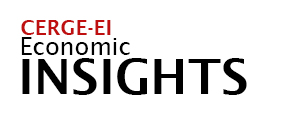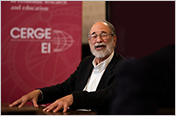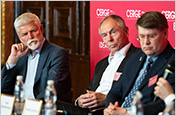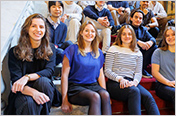|
|
|
|
|
 |
A Digest of CERGE-EI Research and Events
Located in Prague, CERGE-EI is dedicated to excellence and innovation in economic research and education. Chartered by the State of New York, CERGE-EI is a joint workplace of Charles University and the Czech Academy of Sciences, and is supported by numerous donors.
|
|
| » Journal Articles » Working Papers » Meet OUR graduateS » At CERGE-EI |
|
|
Selected Journal Articles
|
 |
History’s Masters The Effect of European Monarchs on State Performance
Sebastian Ottinger and Nico Voigtländer
Econometrica 93(1): 95–128
This study compiles reign-level data on European monarchs (10th–18th century) to show that the cognitive ability of national leaders strongly influenced state performance. Using inbreeding as an instrument, the authors find that these effects are causal. Rulers mattered most where their power was unconstrained by parliaments. Read more
|
|
|
 |
Personalized Pricing and the Value of Time: Evidence from Auctioned Cab Rides
Nicholas Buchholz, Laura Doval, Jakub Kastl, Filip Matejka, and Tobias Salz
The authors show that personalized cab ride pricing reflecting wait time preference can increase welfare overall. Based on 1.9 million ride requests by customers and 5.2 million bids by cab drivers from a large ride-hail platform, they estimated the trade-off between wait time and price. Personalised pricing led to a 5.2% increase in overall surplus while consumer surplus declined by 2.5%. Read more
|
|
|
 |
Crowding in or Crowding Out? Evidence from Discontinuity in the Assignment of Business R&D Subsidies
Matěj Bajgar and Martin Srholec
The authors estimate that business research and development (R&D) subsidies in Czechia stimulated R&D expenditure in small and medium-sized enterprises, with 1 unit of public subsidy leading to approximately 2.3 units of additional R&D investment. This positive effect persisted over time. In contrast, subsidies crowded out private R&D expenditure in large firms. These results are relevant to other European countries with similar systems of business R&D stimulation. Read more
|
|
|
|
More journal articles here |
|
|
|
|
|
|
|
Selected Working Papers
|
|
Retirement Age Reforms and Worker Substitutability: Implications for Employment of Older Workers
Sona Badalyan
How do labor demand factors influence responses to raising the retirement age? Studying a German early retirement reform, the author shows that firms were able to retain older workers who were harder to replace internally and externally, particularly those with job-specific skills or in managerial roles. The reform resulted in reduced turnover costs and wages, often via partial retirement. Read more.
|
 |
|
|
Leading by Example Among Equals
Konuray Mutluer
It is hard to predict when a social movement will achieve the size needed for its success. The author argues that a small change in the environment, even at a higher personal cost, can prompt many to participate instead of “free-riding.” This occurs because earlier participants can trigger action by example, leading others to join, especially when increased costs make their own participation contingent on previous action. Read more
|
 |
|
Firm-level Uncertainty and Frictions: Implications for Capital and Financial Decisions in the US
Danilo Stojanović and Veljko Bojović
By examining firm-level uncertainty about future profit and fixed capital investment, the authors show that high-investing firms cut their investment rate more sharply than other firms in response to increased uncertainty. Policymakers need to consider the heterogeneous impact of uncertainty to identify firms most sensitive to uncertainty shocks and the complementarity between real and financial frictions. Read more
|
 |
|
|
| More working papers here |
|
|
|
|
|
|
|
|
|
Meet our Graduates
|
 |
Essays on Aggregate and Distributional Effects of Macroeconomic Policies
Dušan Stojanović
Dušan defended his dissertation, “Essays on Aggregate and Distributional Effects of Macroeconomic Policies,” in January 2025 under the supervision of Ctirad Slavík and Marek Kapička.
The first chapter examines the distributional effects of the European Central Bank’s quantitative easing policy in the euro area. While existing models focus on financial market segmentation, Dušan incorporates segmented labor markets—arising from capital-skill complementarity and asymmetric wage rigidities—into the analysis. His results show that this addition significantly alters inequality outcomes, dampening total income inequality effects while amplifying wealth inequality.
|
|
We are pleased to introduce one of our recent graduates, Dušan Stojanovic, who has joined the Fiscal Policy Analysis B.2 team at the Joint Research Centre (JRC) of the European Commission in Seville, Spain. In his role as Economic Analyst - General equilibrium modeler, Dušan focuses on the development and maintenance of the EDGE-M3-IM model, a theoretical framework designed to analyze the aggregate and distributional effects of pension and tax reforms within the European Union.
Dušan's research interests lie in macroeconomics, fiscal and monetary policy, heterogeneous agent models, and inequality, with a strong focus on theoretical modeling of macroeconomic mechanisms.
|
In the second chapter, Dušan develops a model that explores the effects of government spending in the presence of high training costs for new hires. He shows that even when firms experience production disruption due to training costs, the economy can expand through extensive hiring of low-skilled workers.
The third chapter, co-authored with Danilo Stojanović, investigates the influence of changes in firms’ entry, exit, and borrowing on the propagation of tax shocks in the U.S. economy. We apply a proxy-SVAR model to isolate exogenous variations in tax changes. The model indicates that corporate income tax cuts increase capital accumulation, which relaxes collateral constraints and provides firms with additional funds. These funds sustain initial tax stimulative effects on aggregate productivity and output growth.
We congratulate Dušan and wish him continued success in his work.
|
|
|
|
More dissertations here |
|
|
|
|
|
|
|
At CERGE-EI
|
|
|
|
|
|
|
|
|
|
|
|
|
|
 |
|
 |
|
 |
|
|
|
|
|
|
|
|
|
Nobel Laureate Professor Alvin E. Roth’s Visit at CERGE-EI
|
|
The ESC Policy Forum opened by Czech President Petr Pavel
|
|
Deadline for Applications to CERGE-EI Programs is Approaching
|
|
|
|
|
|
|
|
|
|
On May 7, CERGE-EI faculty, researchers, students, and alumni had a unique opportunity to meet Nobel Laureate Alvin E. Roth in Prague. Professor Roth delivered a lecture, “Who Gets What? The New Economics of Matching and Market Design,” for the Science at the Castle series, supported in part by Nadace CERGE-EI. Photos of the event at CERGE-EI can be found here. You can watch a video recording of Professor Roth’s lecture here.
|
|
On Friday, May 30, CERGE-EI’s Executive and Supervisory Committees (ESC) hosted a discussion forum on Global and European Challenges for Security and Economic Policy. The opening address was delivered by Czech President Petr Pavel, who emphasized the critical importance of defense and international cooperation in today's world. The discussion was moderated by Jan Švejnar. View the photo gallery here.
|
|
CERGE-EI’s Master in Economic Research and PhD in Economics are Western-style study programs that provide excellent preparation not only for a research career, but also skills directly applicable to a variety of jobs. Our degrees are recognized in both the U.S. and EU. The extended deadline for applications for 2025/2026 is August 23, 2025. Attend our webinar on July 16 or choose another opportunity to learn more from our list of events for study applicants.
|
|
|
|
|
Politických vězňů 7
Praha 110 00
Czech Republic
This email address is being protected from spambots. You need JavaScript enabled to view it.
Tel: (+420) 224 005 123
|
 |
|
|
|
|
|
|
|
|
